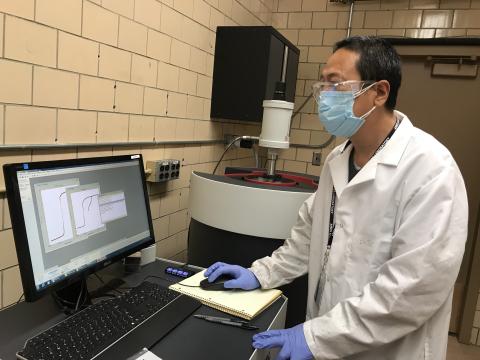
Ames Laboratory will partner with Electron Energy Corporation to improve a mainstay of magnet technology-- the samarium cobalt (SmCo) magnet.
Since their development in the 1960s, SmCo magnets have been a workhorse in modern technology, second only in strength to neodymium magnets. They are extremely resistant to demagnetization, and able to withstand high heat and corrosion.
That high magnetic power density and excellent temperature stability has made SmCo magnets the first choice for many uses, including military, spacecraft, aerospace, and marine applications.
The one downside to SmCo magnets? They are brittle. The process by which they are made, pressing metal powder into a solid mass, called sintering, makes them susceptible to chipping and fractures during the manufacturing process, as well as failure in any environment where there is too much vibration or mechanical shock.
“The structural fragility of these magnets creates a lot of waste in the manufacturing process, and limits their applications in many technologies where they would otherwise be a good choice,” said Baozhi Cui, a scientist at the Critical Materials Institute (CMI) who leads a team that researches ways to make rare earth permanent magnets more powerful, efficient, mechanically robust, and cost-effective.
“There is a real niche here in the magnet market, with great opportunities,” said Melania Jasinski, Director of Engineering for the Electron Energy Corporation (EEC), which is a major domestic producer of SmCo magnets, “So the company is highly interested in optimizing our production. We look forward to a fruitful collaboration with Ames.”
The technology to produce a stronger SmCo magnet was funded and developed by the CMI, a public/private partnership that brings together experts from U.S. Department of Energy National Laboratories, universities, and industry partners, which includes EEC, to work on innovative technology solutions to supply chain challenges.
Ames Laboratory and EEC will work together on the magnet improvements, with the Laboratory optimizing the materials, and the manufacturer adapting it to cost-effective industrial scale production. Work is expected to start in December, 2020.
To accomplish these research and development aims, the Laboratory was awarded $250,000 in June 2020 as part of a larger $33 million in funding by the U.S. Department of Energy’s Office of Technology Transitions (OTT) Technology Commercialization Fund (TCF). TCF advances the commercialization of promising energy technologies and strengthens partnerships between DOE National Laboratories and private sector companies to deploy technologies to the marketplace. Participating companies provide matching funds.
To explore similar membership opportunities with CMI, please find more information here, or contact CMI Partnerships Manager Stacy Joiner.
The Critical Materials Institute is a Department of Energy Innovation Hub led by the U.S. Department of Energy's Ames Laboratory and supported by the Office of Energy Efficiency and Renewable Energy’s Advanced Manufacturing Office, which supports early-stage applied research to advance innovation in U.S. manufacturing and promote American economic growth and energy security. CMI seeks ways to eliminate and reduce reliance on rare-earth metals and other materials subject to supply chain disruptions.
Ames Laboratory is a U.S. Department of Energy Office of Science national laboratory operated by Iowa State University. Ames Laboratory creates innovative materials, technologies and energy solutions. We use our expertise, unique capabilities and interdisciplinary collaborations to solve global problems.
DOE’s Office of Science is the single largest supporter of basic research in the physical sciences in the United States, and is working to address some of the most pressing challenges of our time. For more information, please visit science.energy.gov.
Contacts:
Tom Lograsso, Director, Critical Materials Institute, 515-296-4500
Laura Millsaps, Communications, Ames Laboratory, 515-294-3474
